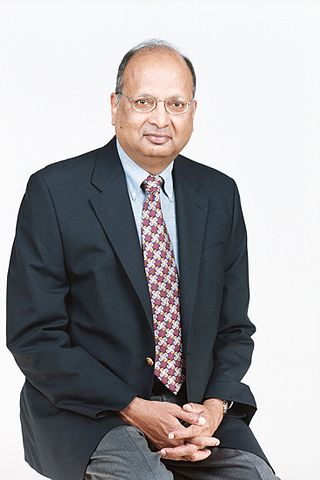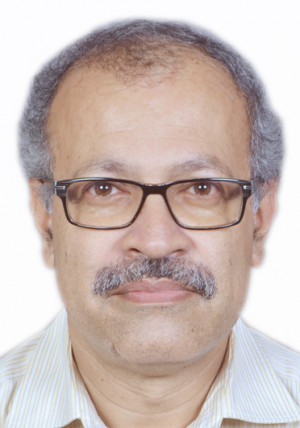Related Research Articles

Arogyaswami J. Paulraj is an Indian-American electrical engineer, academic. He is a Professor Emeritus in the Dept. of Elect. Engg. at Stanford University.

Wilmer Lanier Barrow was an American electrical engineer, inventor, teacher, industrial manager, and a counselor to government agencies. He obtained a BSEE degree in 1926 from Louisiana State University, and a doctorate from the Technical University of Munich in 1931. During the pre-World War 2 development of radar at Massachusetts Institute of Technology, Barrow performed research on microwaves, inventing waveguide in 1936 and the horn antenna in 1938.
Jack Keil Wolf was an American researcher in information theory and coding theory.

Richard H. Frenkiel is an American engineer, known for his significant role in the early development of cellular telephone networks.
Fred Barry Schneider is an American computer scientist, based at Cornell University, where he is the Samuel B. Eckert Professor of Computer Science. He has published in numerous areas including science policy, cybersecurity, and distributed systems. His research is in the area of concurrent and distributed systems for high-integrity and mission-critical applications.
Keith Glover FRS, FREng, FIEEE is a British electrical engineer. He is an emeritus professor of control engineering at the University of Cambridge. He is notable for his contributions to robust controller design and model order reduction.

Shrikanth Narayanan is an Indian-American Professor at the University of Southern California. He is an interdisciplinary engineer–scientist with a focus on human-centered signal processing and machine intelligence with speech and spoken language processing at its core. A prolific award-winning researcher, educator, and inventor, with hundreds of publications and a number of acclaimed patents to his credit, he has pioneered several research areas including in computational speech science, speech and human language technologies, audio, music and multimedia engineering, human sensing and imaging technologies, emotions research and affective computing, behavioral signal processing, and computational media intelligence. His technical contributions cover a range of applications including in defense, security, health, education, media, and the arts. His contributions continue to impact numerous domains including in human health, national defense/intelligence, and the media arts including in using technologies that facilitate awareness and support of diversity and inclusion. His award-winning patents have contributed to the proliferation of speech technologies on the cloud and on mobile devices and in enabling novel emotion-aware artificial intelligence technologies.
Mangalore Anantha Pai was an Indian electrical engineer, academic and a Professor Emeritus at the University of Illinois at Urbana–Champaign. A former professor of electrical engineering at the Indian Institute of Technology, Kanpur, he is known for his contributions in the fields of power stability, power grids, large scale power system analysis, system security and optimal control of nuclear reactors and he has published 8 books and several articles. Pai is the first India born scientist to be awarded a PhD in Electrical Engineering from the University of California, Berkeley.
Vivek Shripad Borkar is an Indian electrical engineer, mathematician and an Institute chair professor at the Indian Institute of Technology, Mumbai. He is known for introducing analytical paradigm in stochastic optimal control processes and is an elected fellow of all the three major Indian science academies viz. the Indian Academy of Sciences, Indian National Science Academy and the National Academy of Sciences, India. He also holds elected fellowships of The World Academy of Sciences, Institute of Electrical and Electronics Engineers, Indian National Academy of Engineering and the American Mathematical Society. The Council of Scientific and Industrial Research, the apex agency of the Government of India for scientific research, awarded him the Shanti Swarup Bhatnagar Prize for Science and Technology, one of the highest Indian science awards for his contributions to Engineering Sciences in 1992. He received the TWAS Prize of the World Academy of Sciences in 2009.

Soumitro Banerjee is an Indian electrical engineer and director of the Indian Institute of Science Education and Research, Kolkata. He is known for his studies on bifurcation phenomena in power electronic circuits and is an elected fellow of all three major Indian science academies: the National Academy of Sciences, India, Indian Academy of Sciences, and Indian National Science Academy. He is also a fellow of The World Academy of Sciences, Institute of Electrical and Electronics Engineers, West Bengal Academy of Sciences and the Indian National Academy of Engineering. The Council of Scientific and Industrial Research, the apex agency of the Government of India for scientific research, awarded him the Shanti Swarup Bhatnagar Prize for Science and Technology, one of the highest Indian science awards for his contributions to Engineering Sciences in 2003.
Ranjan Kumar Mallik is an Indian electrical and communications engineer and a professor at the Department of Electrical Engineering of the Indian Institute of Technology, Delhi. He held the Jai Gupta Chair at IIT Delhi from 2007 to 2012 and the Brigadier Bhopinder Singh Chair from 2012 to 2017. He is known for his researches on multiple-input multi-output systems and is an elected fellow of all the three major Indian science academies viz. Indian Academy of Sciences, Indian National Science Academy, and The National Academy of Sciences, India. He is also an elected fellow of The World Academy of Sciences, Indian National Academy of Engineering, and The Institute of Electrical and Electronics Engineers, Inc.
Yendluri Shanthi Pavan is an Indian electrical engineer and a professor at the Department of Electrical Engineering of the Indian Institute of Technology, Madras. He is known for his studies on mixed signal VLSI circuits and is an elected fellow of the Indian National Academy of Engineering. He is also a fellow of IEEE. The Council of Scientific and Industrial Research, the apex agency of the Government of India for scientific research, awarded him the Shanti Swarup Bhatnagar Prize for Science and Technology, one of the highest Indian science awards for his contributions to Engineering Sciences in 2012.
Paul Juan Tasker is an electrical engineer known for his research on microwaves. He is a professor at Cardiff University, Wales, and a Fellow of the Institute of Electrical and Electronics Engineers.
Dr. Laura Bottomley, from North Carolina State University in Raleigh, North Carolina, is an electrical engineer.

Tony Jun Huang is the William Bevan Distinguished Professor of Mechanical Engineering and Materials Science at Duke University.

Lee Jong-ho is a South Korean electronic engineer and professor of electrical and computer engineering at Seoul National University. He serves as Minister of Science and ICT in the Yoon Suk-yeol government since May 2022.
Yuhui Shi is a pioneer in particle swarm optimization algorithms and the developer of brain storm optimization algorithms. He was an electrical engineer from Xi'an Jiaotong-Liverpool University in Suzhou, China, where he was named a Fellow of the Institute of Electrical and Electronics Engineers (IEEE) in 2016 for his contributions to particle swarm optimization algorithms. He earned his PhD in electrical engineering from Southeast University, Nanjing, China in 1992, and was trained as a Post Doc Fellow at Concordia University under Canadian International Development Agency joint doctoral program, initiated by Prof. Jeremiah F. Hayes et al. He organized the first IEEE Symposium on Swarm Intelligence in 2003, and established the IEEE CIS Task Force on Swarm Intelligence in 2002, when he co-authored a book with James Kennedy and Russell C. Eberhart. He is a Chair Professor in the Department of Computer Science and Engineering, Southern University of Science and Technology (SUSTech), Shenzhen, China, where he invited Prof. Jun (Steed) Huang, from the Joint Institutes of Carleton University and the University of Ottawa, for a collboration on swarm intelligence robotics.
Francis "Frank" J. Doyle III is an American engineer and academic administrator. He is a professor of Engineering and provost of Brown University.
As of 2023, the Institute of Electrical and Electronics Engineers (IEEE) has 7,236 members designated Fellow, each of whom is associated with one of the 41 societies under the IEEE.
Stella W. Pang is an engineer known for her work on microfabrication, biomaterials, nanostructures, microelectromechanical systems, and microfluidics. She is Chair Professor of Electrical Engineering at the City University of Hong Kong, Director of the Centre for Biosystems, Neuroscience, and Nanotechnology, and was the Head of the Department of Electrical Engineering.
References
- ↑ "Faculty & instructor directory". College of Science and Engineering. Retrieved 2022-12-02.
- ↑ "2016 elevated fellow" (PDF). IEEE Fellows Directory.